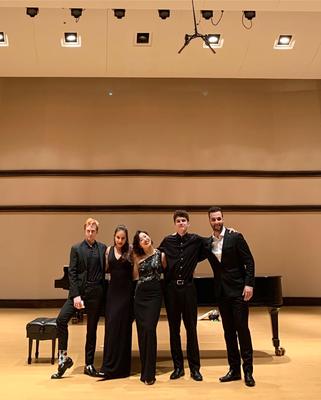 Musician Anna Lee '20 was caught by surprise when a child asked her ensemble a deeply philosophical question about artmaking. The question raised more than just an answer.
Musician Anna Lee '20 was caught by surprise when a child asked her ensemble a deeply philosophical question about artmaking. The question raised more than just an answer.
By Guest Blogger Anna Lee '20
Anna Lee ’20, a resident of Lowell House concentrating in Comparative Literature, was awarded an Artist Development Fellowship to attend the Ravinia Festival’s Steans Music Institute Program for Piano and Strings. Lee has performed as soloist with the New York Philharmonic, Frankfurt Radio Orchestra and Singapore Symphony Orchestra, among other orchestras. She has also performed with world-renowned musicians such as Christoph Eschenbach, Mitsuko Uchida and Steven Isserlis. Her senior thesis focuses on the role of music in society by using poetry to look at rhythm, rhyme and the musical play of words. After graduation, she plans to pursue a career in music performance and pedagogy.
As part of the Program for Piano and Strings at the Ravinia Festival's Steans Music Institute, I participated in what I expected to be a fairly uneventful outreach session, called Reach, Teach, Play. After performing the first movement of César Franck’s Piano Quintet, the musicians took questions from kids ages 8 to 12, and this one question led to a startling conversation: “How do you play if you are disappointed or feel bad? Or just don't want to?”

My colleagues and I looked at each other, trying to come up with words for a question that was at once both deeply philosophical and obviously simple. The most direct – and perhaps most cynical – answer would have been: “This is our job, and we all have to go to work even if we don't always want to”. After all, playing music is what we do for a living. But we knew that this kid was asking a different question, a question hinting at the root of why we had all chosen this profession.
Eventually, our first violinist Raphaëlle answered: “We still play even if we are sad or don't have the right energy to because whatever we have, we give it to the music, and the music accepts it. You know, sometimes it feels like everything is too difficult and you just don't want to do anything, but with music, it is always there for you.” It was as close to a sincere answer as any of us could have hoped for.
Later, our group was sharing our reflections on the session and we came back to this powerfully simple question. We realized that we all had decided to dedicate our lives to music because even with all of the doubts, sore muscles, diminishing funds and the terrifying news that the arts are rapidly diminishing in society, we had at some point in our lives so strongly felt that music needs to be played and heard – because if we just turn to it, it would accept whoever we are, wherever we are. For us, music is the universal voice that answers hard, unspoken questions, and at the same time, the most specific voice that addresses the deeper root of why we asked these questions in the first place.
Maybe it's a moot point to make to those who already love the arts, but I'm not sure it can be overstated: Music, or any art, is indispensable and incredibly fundamental to personal and societal flourishing. For crying out loud, art needs to be heard, seen, felt, touched and experienced on a daily basis in order to feed the parts of human beings that cannot be nourished with food. Art is a crying, out loud, of human compassion, desire, need, that which often cannot be explained. As Robin Williams’ character in the movie Dead Poets Society so succinctly put it: “Medicine, law, business, engineering – these are noble pursuits and necessary to sustain life. But poetry, beauty, romance, love – these are what we stay alive for.”
As for me, I will continue to do what I can: Play out loud the music I so love.